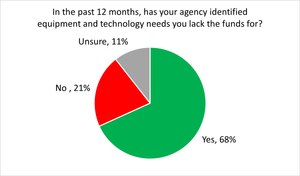
A majority of first responder agencies lack necessary funds for purchasing equipment and technology
Most first responders lack the funds to purchase equipment and technology. Email subscribers and site visitors to Police1, FireRescue1, EMS1 and Corrections1 were invited to answer this question, “In the past 12 months, has your agency identified equipment and technology needs you lack the funds for?"
A convenience sample of respondents, including law enforcement officers, firefighters, EMS providers and corrections officers report a significant lack of funding to purchase equipment and technology needs for their department. According to the poll results, 68% of all respondents indicated that their agencies had identified equipment and technology needs over the past 12 months for which they lacked the necessary funding, while just 21% said their department doesn’t lack funding and 11% were unsure.
A significant percentage of agencies appear to be struggling with budgetary constraints that prevent them from acquiring equipment and technology resources. This lack of funding could potentially impact the efficiency and effectiveness of these agencies in performing their duties, which could, in turn, affect public safety and emergency response times.
The response is even more concerning for fire and EMS. The responses, sorted by site, show 87% of FireRescue1 and 82% of EMS1 respondents selected “Yes,” which was significantly more than the 62% of Police1 and 60% of Corrections1 respondents.
For agency chiefs and administrators, these findings highlight the need for increased advocacy for funding at the local, state and national levels. As technology continues to evolve at a rapid pace, it's crucial to ensure that first responder agencies are equipped with the latest tools to carry out their mission. The results also suggest a possible need for more efficient budget management or alternative funding sources, such as grants or private-sector partnerships.
In addition to advocating for increased funding from local, state and federal elected officials, here are three other avenues for fire departments, law enforcement agencies, corrections departments and EMS agencies to fill the funding gap.
1. Pursue grants. Numerous federal, state and private organizations offer grants specifically for first responders. These grants can help fund new equipment, technology and training. Agencies should assign personnel to actively seek out and apply for these opportunities. These include not only large federal programs, but also smaller local and private grants that may be less competitive. Make your search faster and the application process more efficient by using PoliceGrantsHelp , FireGrantsHelp , EMSGrantsHelp and CorrectionsOneGrants .
2. Public-private partnerships. Collaborating with businesses and private sector organizations can be a beneficial strategy. Companies may be willing to donate equipment, provide funding or offer discounts in exchange for positive publicity and corporate social responsibility opportunities. These partnerships can also lead to innovative solutions, as private companies often have access to cutting-edge technology.
3. Community fundraising and support. Local communities often show tremendous support for their first responders. Crowdfunding campaigns, charity events or local fundraisers can be effective ways to raise funds. Not only can these initiatives provide much-needed funding, but they also help to strengthen ties between first responders and the communities they serve. It’s important to communicate the specific needs and benefits of the funding to encourage community participation and support.
By exploring these avenues, first responder agencies can potentially bridge the funding gap and ensure they have the necessary equipment and technology to carry out their vital work efficiently and effectively.
While this poll question provides valuable insights, it has several limitations. The sample was a convenience sample, meaning it was composed of individuals who were easily accessible, and the participants may not accurately represent the broader population of first responders. Moreover, the poll did not specify the type of equipment or technology needed, or the severity of the funding shortfall, which could vary widely between different agencies and regions.
While the poll may not provide a complete picture of the funding challenges facing first responder agencies, it does shed light on a significant issue that warrants further investigation. Agency chiefs and administrators should consider these findings as they plan their budgets and advocacy efforts, always striving for the most efficient and effective use of resources to serve and protect their communities.
The Lexipol Media Group is using generative AI to create some content that is edited and fact-checked by our editors.
Copyright © 2025 EmsGrantsHelp.com. All rights reserved.

